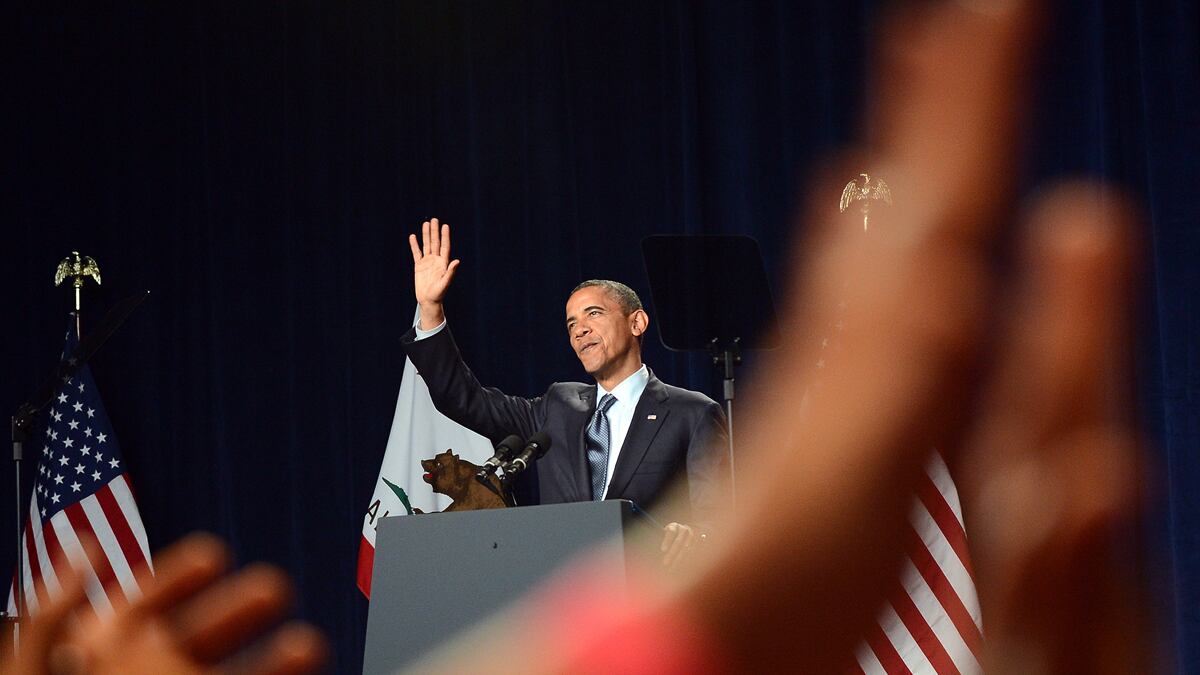You can tell politicians are feeling the heat when they haul out the relatives.
Case in point: President Obama met with big-money Asian-American donors in Silicon Valley on Thursday. They likely heard the same line Obama delivered a couple weeks ago when he made his first appearance before the big Asian Pacific American Institute for Congressional Studies gala in D.C. “When I look at this community,” he said, gazing upon the ballroom with an affectionate smile, “I see family.”
That’s a reference to his half-sister and her husband, and his own childhood in Hawaii and Indonesia. (Although it underscored the president’s absence from previous “Asian Proms”—like saying, You’re my peeps, even if we do always go to my in-laws for Thanksgiving.)
Still, his presence signals an increasing recognition that Asian-American/Pacific Islanders may be a critical sliver of voters this fall—especially in battleground states like Virginia, Nevada, and Florida.
In a metrics-driven community, APAs finally have numbers on their side. The 2010 census anointed APAs the fastest-growing racial minority. The field of Asian-American/Pacific Islander candidates has exploded in this political cycle. Twenty-five of them are campaigning for seats in Congress—triple the 2010 field.
“It’s our time,” says Christine Chen (no relation), acting executive director of APIAVote, a nonpartisan civic engagement group. “We are at where the Latinos were in 2000. We’re looking forward to having the candidates talk and engage with our voters.”
Surrounded by an exploding Korean community in Annandale, Va., small-business owner and activist Dave Han tells me that local pols get it. “We’ve definitely seen more visitors. More politicians come to see us in the last four or five years,” Han says. “They want to hear from us.”

They do? As a former network journalist who’s spent plenty of time with politicians and the Asian-Pacific-American community, this was a surprise. In my 16 years with CNN and CBS, APA voters rarely (OK, never) got a blip of consideration as worthy of news coverage. Outside a few major West Coast centers, they never figured in the political equation.
It’s not just that news organizations didn’t care; for a long time it wasn’t clear the community wanted or was organized enough to earn that kind of attention. No one ever pitched me on writing about Asian-American voters.
If they had, I probably would have demurred, citing favoritism toward my half-Chinese/half-Japanese heritage. But do African-American and Hispanic reporters decline stories about their voting communities? Isn’t the point of recruiting diverse writers to your newsroom the opportunity to bring new stories to light?
Which is why in my post-news life I’ve become active in pushing APA voter stories on my reporter friends. It’s a somewhat uncomfortable role for me, as it is for many APAs to try to draw attention to themselves or their causes.
Culturally conditioned to conform and cooperate as we are, the individualism prized in American public life is a difficult hurdle, even for those of us who were born and raised here. With rare exceptions, APAs just aren’t outwardly offensive or outrageous enough to grab headlines or win big political fights. We don’t lead loud protests or become cable pundits. (I’m already feeling bad about making that snarky comment about the president coming to dinner.)
Even though the community rejects its “model minority” status, we are hell-bent on not doing anything to look like jerks or losers. And let’s face it, who gets on the news?
That makes it hard to get APA political stories told—even when there are interesting ones to tell. In battleground Nevada, the Asian-American population has grown 116 percent since the last census. What’s the impact on the fight for this swing state… and why are so many APAs in Nevada anyway?
Beyond the numbers—there are stories about new Asian faces in politics. In Queens, state Assemblywoman Grace Meng is trying to become New York’s first Asian-American in Congress—bolstering support by reminding voters she’s never been to China, but she has visited Israel and studied law at Benjamin Cardozo.
Or the Texas face-off of the two Joes. Can Joe Chow, a Taiwan-born restaurateur with a very conservative agenda and a charmingly self-mocking campaign slogan (“It’s CHOW time”) unseat Representative Joe Barton—a 27-year-veteran of the House?
And then there’s the national contest, in which APAs may finally be worth more than a “thanks-for-the-cash-gotta-dash”visit.
Veteran pollster Celinda Lake found that while Asian/Pacific Americans generally identify themselves as Democrats, Mitt Romney may have an opening with them. Lake reports that APA voters generally like Obama, but their support for his job performance is shaky, while Romney remains a relatively unknown quantity.
Indeed, given their interest in small business development, entrepreneurship and conservative social values, Asian-American and Pacific voters could warm to Republican candidates at all levels.
In this year of tight races and competitive political news reporting, it all adds up to an opportunity for Asian/Pacific Americans to demand more attention for their issues and candidates. And maybe even get it.





